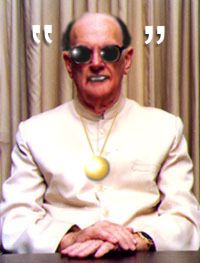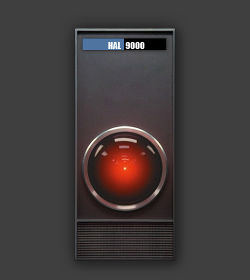Arthur C. Clarke
“If I didn't exist, I would have invented myself.”
– Arthur C. Clarke on Arthur C. Clarke
“There's nothing more natural than the love that exists between Arthur C. Clarke and a small, small Sri Lankan boy.”
– Oscar Wilde on Arthur C. Clarke
Arthur C Clarke (the 'C' stands for Credibility) is a world famous fortune teller who lived much of his life in a small island in the Indian Ocean which he shared with many nice, native boys. Born in Minehead, England he grew up traumatised by the Somerset regional accent and at an early age moved to the welcoming streets of London performing a variety of services for rich gentlemen. He would become famous in latter life as the author of three versions of essentially the same book, and as a guy who would look dreamy-eyed into a camera whilst talking about unexplained phenomena. He was not a paedophile.
Outlandish Claims[edit | edit source]
The author has been know to make a wide number of claims which some have linked to his rampant self-absorption. In 1942 he successfully claimed to have invented the typewriter and underwear, whilst less than a year later he claimed water was based on one of his earlier ideas. During the 1960s "his ideas" included the Beatles, assassinating Kennedy and landing on the Moon. Clarke also predicted 100% safe online banking and online shopping.
Private Life[edit | edit source]
During the Second World War Clarke served in the Royal Air Force under the reknowned war hero Biggles and despite his then lowly station would often be found sitting in the Officer's Mess. Following the war he managed to call in some favours and get himself into college where he would idle the days away reading poetry and writing rambling claims about crazy concepts like geostationary satellites and notes about his obsession with stone monoliths.
He spent the last thirty years of his life living quietly (with 37 Sri Lankan boys in hotpants) on an island in the Indian Ocean, persuading people that he was a famous author and not a massive paedophile.
Writing[edit | edit source]
Clarke is the author of numerous science fiction novels, such as Childhood's End (1953), A Fountain of Young Boys (1978), and Cradle (1987), as well as non-fiction works such as The Young Traveler in Space (1954) and Nubile Teen Beneath the Sea (1958). His many short stories include "Trouble with the Natives" (1951) and "Out of the Cradle, Endlessly Orbiting" (1959).
Things Arthur C. Clarke claims to have invented[edit | edit source]
- All Life on Earth
- Fire
- The Wheel
- Isaac Asimov
- HAL 9000 (the first computer to successfully remove Windows 95 from its system)
- The Internet
- Low Orbit Satellites
- The years 2001 through to 3001
- Stanley Kubrick
Arthur C Clarke's Laws of Pro Gaming[edit | edit source]
After inventing the Nintendo Cube 64 in 2001, Arthur C. Clarke formulated the following three "laws" of pro gaming:
- When a distinguished but elderly pro gamer states that the game is crap, he is almost certainly right. When he states that the game is worse than 50 Cent: Bulletproof, he is very probably wrong.
- The only way of discovering the limits of the possible is noclip.
- Any sufficiently advanced skill is indistinguishable from hacking.




